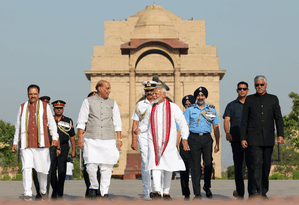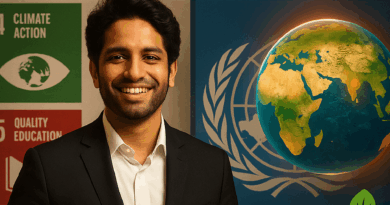India highlights need for ocean resource mapping at Second Blue Talks in Delhi
New Delhi, May 21: India has successfully hosted the ‘Second Blue Talks’ which have paved the way to accelerate action and galvanize concrete commitments towards the conservation and sustainable use of the world’s oceans, directly aligning with the United Nations Ocean Conference 3 theme, according to an official statement issued on Wednesday.
Addressing the event, M. Ravichandran, Secretary of India’s Ministry of Earth Sciences (MoES) said, “To truly achieve SDG 14 and the goals of the UN Ocean Decade, we must prioritise comprehensive ocean resource mapping, develop cutting-edge technologies, implement policy interventions, and invest in building robust human capital for our marine future.” SDG 14, “Life Below Water”, is a United Nations Sustainable Development Goal that focuses on conserving and sustainably using the oceans, seas, and marine resources for sustainable development.
This event is a key milestone in the lead-up to the 3rd United Nations Ocean Conference (UNOC3), to be held in Nice, France, from June 9 -13. The event, which was held in Delhi on Tuesday, was chaired by Dr M. Ravichandran and co-chaired by Nestor Baltodano Vargas, Ambassador of Costa Rica to India, and Damien Syed, Deputy Head of Mission, French Embassy. Addressing the meeting, H. Nestor Baltodano Vargas, Ambassador of Costa Rica, mentioned, “This event will significantly strengthen collaboration between our nations, driving concrete action towards SDG 14” At the event, MoES launched a white paper titled ‘Transforming India’s Blue Economy: Investment, Innovation and Sustainable Growth’ in collaboration with its strategic knowledge partner. Building upon the success of the first Blue Talks held in February 2024, the second meeting convened leading scientists, policymakers, global stakeholders, and representatives from government, academia, industry, and civil society.
The forum aimed to accelerate action and galvanise concrete commitments towards the conservation and sustainable use of our oceans, directly aligning with the UNOC3 theme. As the nodal agency for the implementation of the Blue Economy in India, MoES has been actively working towards enhancing the visibility and effective implementation of blue economy initiatives across the nation. This white paper builds upon these efforts by providing a consolidated framework that aligns government actions, fosters cross-sectoral synergies, and promotes greater investment to unlock the vast potential of India’s ocean resources for sustainable and economic development. The report released at the event underscores the critical role of India’s vast marine resources, including its extensive coastline and Exclusive Economic Zone, as a vital engine for national progress.
It highlights the collaborative efforts of 25 ministries, alongside coastal state and union territory initiatives, in driving sustainable growth across various ocean-related sectors. The report builds upon India’s G20 Presidency commitments and the Chennai High-Level Principles for a Sustainable and Resilient Blue Economy, further solidifying its importance within the Viksit Bharat vision for 2047. While acknowledging significant sectoral progress, the white paper emphasises the need for a unified and coordinated approach to overcome existing challenges. It identifies key impediments to growth, limited data sharing, low private investment, and technology gaps, particularly in emerging areas like offshore wind and deep-sea exploration. It highlights pragmatic interventions, scalable and replicable models from across India, including women-led seaweed farming, smart port development, and green ship recycling, demonstrating the potential for achieving both economic growth and environmental sustainability.
The core objective of the second Blue Talks was a dynamic stakeholder consultation session centred around four themes. The first theme focuses on conserving, sustainably managing, and restoring marine and coastal ecosystems. The second theme centres around increasing ocean-related scientific cooperation, knowledge building, marine technology, and education for enhanced ocean health.
The third theme emphasises significantly reducing marine pollution from land-based activities and beyond, while the fourth theme aims at leveraging the interconnectedness of the ocean, climate, and biodiversity. Damien Syed, Deputy Head of Mission, French Embassy, further stated, “As India progresses with the ratification of the BBNJ Agreement, and with UNOC3 on the horizon this June, this is a crucial moment to gather profound perspectives from India’s leading ocean experts.” This event fostered detailed discussions, encouraging collaborative problem-solving and the generation of innovative solutions essential for long-term ocean sustainability.



